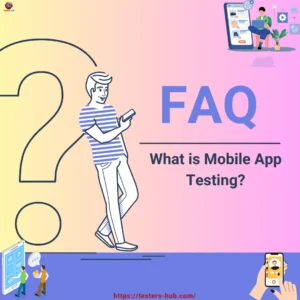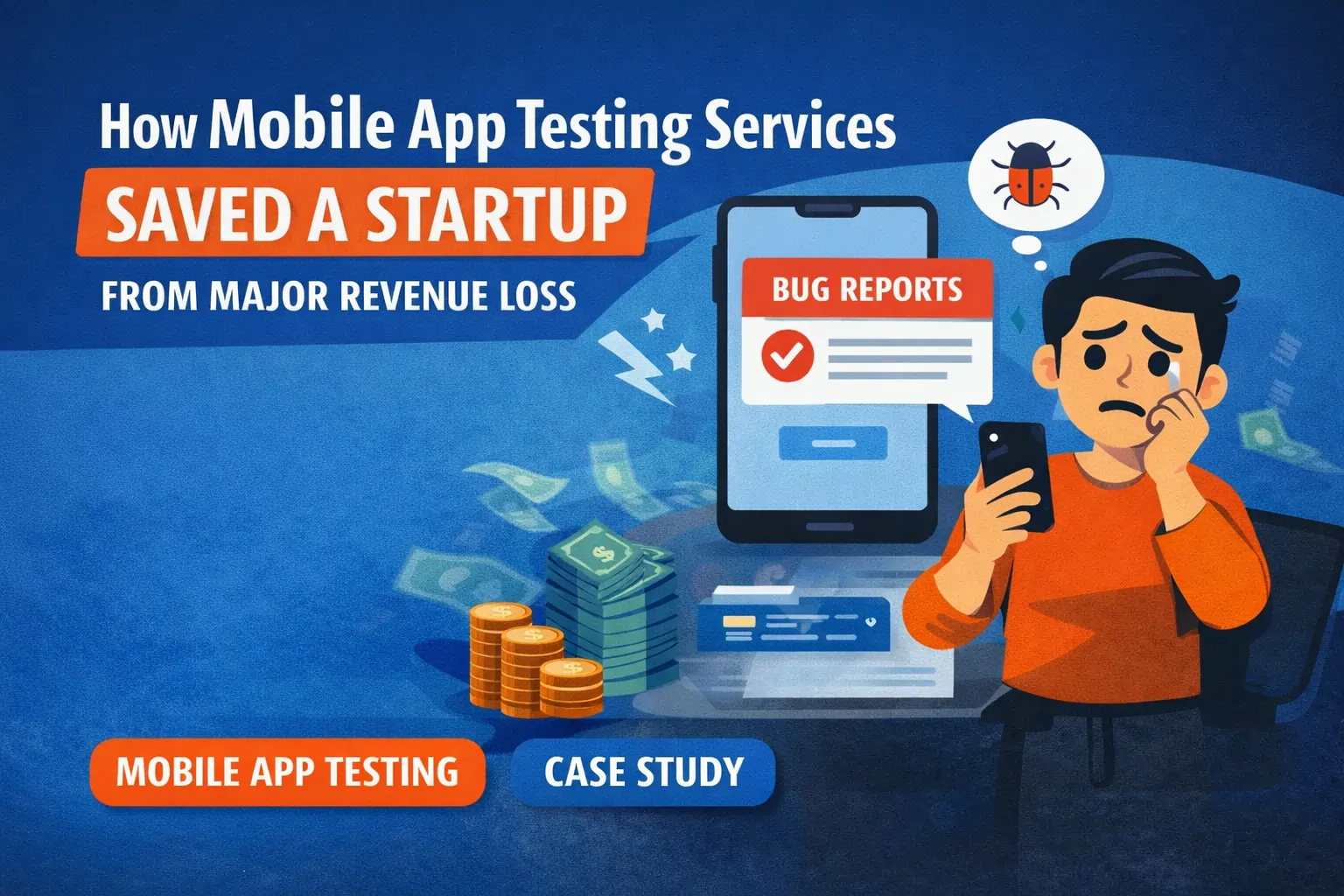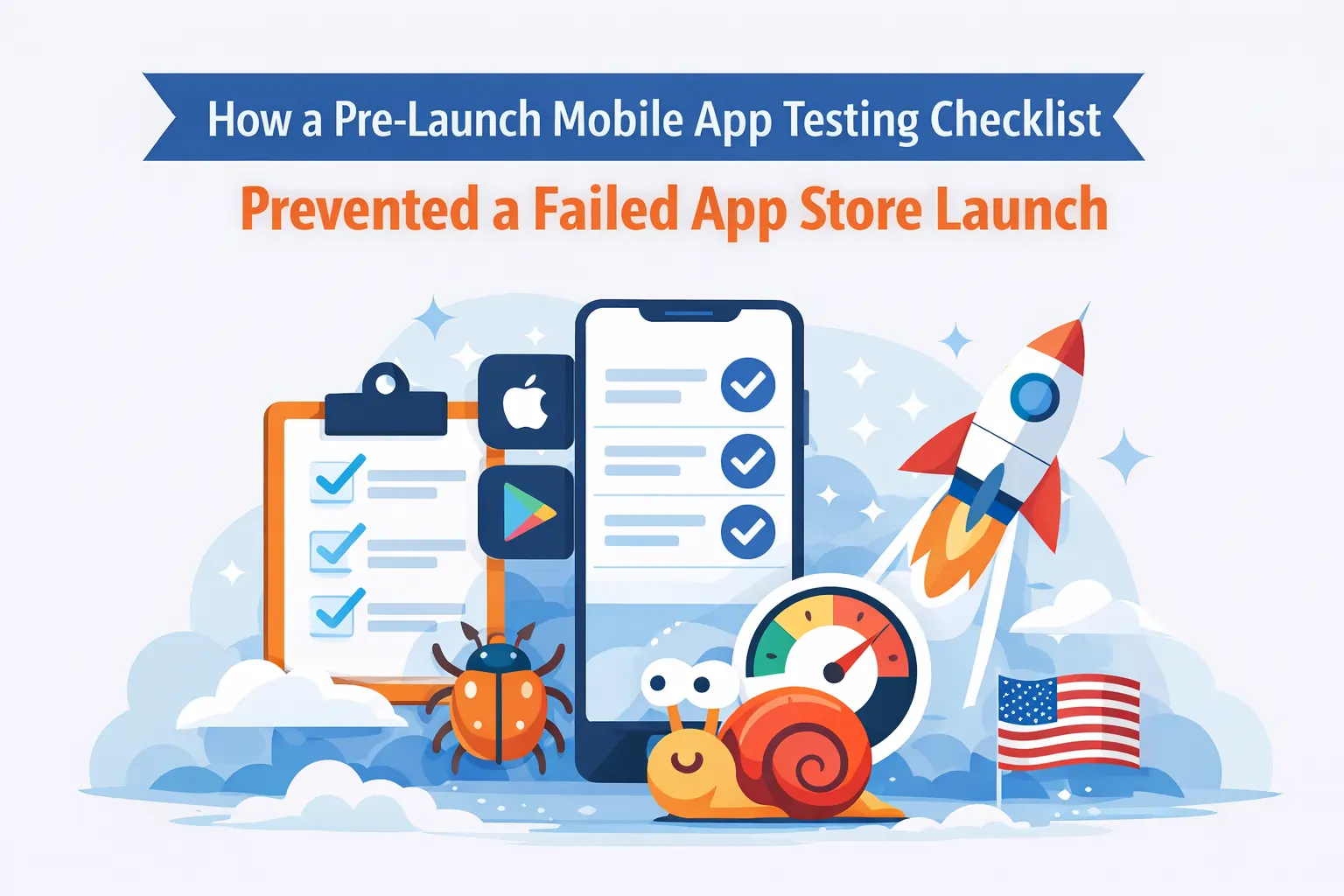Mobile App Testing: Everything You Need to Know
Ensuring a mobile app’s quality and reliability is crucial, especially with mobile devices now being essential in the lives of billions. Thorough testing—whether for iOS, Android, or cross-platform applications—is key to delivering an app that operates smoothly, safeguards user data, and offers an excellent user experience.
In this blog, we’ll discuss why mobile app testing is so important, how it benefits businesses, and the main differences between mobile and web app testing.
What is Mobile App Testing?
Mobile app testing is a vital step in the development process, focused on verifying that an app functions as intended on various devices, operating systems, and network conditions. The purpose of this process is to ensure that the app is not only functional and secure but also user-friendly and compatible across different environments. This testing phase involves both manual and automated techniques, designed to evaluate several critical aspects of the app. These include its performance, functionality, security, and usability. Testing ensures the app performs its intended tasks correctly, offers a seamless and easy-to-use interface, and provides protection against security risks, including data breaches or other vulnerabilities.
Why is Mobile App Testing Critical?
Mobile app testing is critical for several key reasons. Let’s dive into why testing is so important for businesses and developers:
Ensuring a Seamless User Experience
One of the primary reasons mobile app testing is crucial is to ensure a smooth and responsive user experience. Testing helps identify and resolve bugs, performance issues, and crashes before the app reaches users. This process improves user satisfaction, increases the chances of positive reviews, and ultimately boosts user retention. A well-tested app that functions seamlessly enhances the overall experience and keeps users engaged.
Minimizing App Crashes and Downtime
Mobile app testing is essential for uncovering potential crashes, bugs, and system failures before the app is released to users. If these issues are not addressed early on, they can lead to negative user experiences, unfavorable reviews, and harm the app’s reputation. Comprehensive testing evaluates the app’s performance across various conditions, allowing developers to identify and fix problems that could disrupt the app’s functionality. This proactive approach ensures the app runs smoothly, preventing unexpected downtime and maintaining reliability for users.
Testing for Device and OS Compatibility
Given the diverse array of mobile devices and operating systems available, it’s important to make sure your app functions correctly across all platforms. Mobile app testing ensures that the app works seamlessly across different devices, operating systems, and screen sizes. Whether the user is on an older Android model or the latest iPhone, testing confirms that the app provides a reliable and smooth experience, regardless of the specific device or OS version. This ensures that all users can enjoy consistent performance no matter what device they are using.
Safeguarding Security and Data Privacy
With the growing concerns over data privacy, mobile app testing is essential in ensuring that an app securely handles sensitive user information. Testing helps uncover security vulnerabilities, ensuring that personal details, payment information, and login credentials are protected from breaches. It also verifies that data storage, communication, and encryption mechanisms are robust and compliant with privacy standards, giving users confidence in the app’s security measures.
Adhering to App Store Submission Guidelines
Both the Google Play Store and Apple App Store have specific criteria that apps must meet for approval. Mobile app testing is vital to ensure your app complies with these rules and regulations. If an app is not thoroughly tested, it risks failing to meet these standards, which could lead to delays or rejection during the submission process. By thoroughly testing the app, developers can ensure it aligns with store policies, reducing the likelihood of submission issues and allowing the app to be approved and launched smoothly and promptly.
Evaluating Performance Under Various Conditions
Mobile app testing is also essential for assessing how the app performs under various conditions, such as slow network speeds, low battery, or limited memory. Performance testing evaluates how the app behaves when the device is under stress, ensuring it remains responsive and functional. Since these conditions are common in mobile usage, testing ensures that the app delivers a reliable and consistent experience, even when the device faces technical limitations or external factors like connectivity issues.
In conclusion, mobile app testing is vital for ensuring that the app delivers a high-quality, secure, and seamless experience to users across a range of devices, platforms, and conditions. It helps to prevent potential issues, improves user satisfaction, and ensures that the app is compliant with industry standards and store requirements.
How Does App Testing Benefit Your Business?
Mobile app testing offers several business benefits that can enhance your product’s success and customer satisfaction. Let’s look at the benefits mobile app testing brings to the table:
1. Improved Quality and Reliability
By performing comprehensive testing, you can identify bugs and issues early in the development process. Fixing these issues before launch ensures that the final product is of the highest quality and free of defects. A reliable, high-quality app boosts brand reputation, attracts positive reviews, and fosters customer loyalty.
2. Cost Savings in the Long Run
Identifying bugs early saves businesses from the high cost of fixing issues after launch. Post-launch fixes can be expensive, especially when issues are severe or impact user data. By detecting and resolving problems during the development phase, businesses can minimize the overall cost of app maintenance and updates.
Improved User Experience and Retention
Thorough app testing ensures that the final product is intuitive, responsive, and easy to use. When an app performs well, without glitches or usability issues, users are more likely to enjoy their experience and engage with the app regularly. A smooth, bug-free app increases user retention, as people are more inclined to return to an app that functions seamlessly and meets their needs effectively.
Accelerated Time to Launch
While testing may initially add time to development, it ultimately shortens the time to launch by addressing potential issues early. By identifying bugs or usability problems in advance, developers can resolve them before they become major roadblocks, avoiding costly delays or rework. Automated testing can further streamline the process, allowing for faster, more efficient testing cycles.
Boosted App Store Reviews and Downloads
Apps that undergo thorough testing are more likely to perform well, leading to positive user reviews and higher ratings in app stores. Users tend to leave better feedback for apps that function smoothly, with fewer crashes or bugs. High ratings and positive reviews increase the app’s visibility, encouraging more downloads and contributing to its overall success in app marketplaces.
6. Enhanced Brand Image
A well-performing app reflects positively on your brand. If your app is stable, fast, and secure, users will trust your brand more. Consistently delivering high-quality mobile experiences helps build a strong reputation and increases brand loyalty.
How is Mobile App Testing Different from Web App Testing?
While mobile app testing and web app testing have similarities, they differ in several key ways. Let’s explore the differences between these two types of testing:
1. Platform-Specific Testing
- Mobile App Testing: Mobile apps are developed for specific platforms, like iOS or Android, and need to be tested on various mobile devices, each with its unique specifications.
- Web App Testing: Web apps are platform-independent and accessed through web browsers, so they must be tested for compatibility across different browsers (Chrome, Firefox, Safari, etc.).
- User Interaction.
- Mobile app testing uses touch-based motions (tapping, swiping, and pinching) as well as hardware components like cameras, GPS, and accelerometers. Testers must analyze how well these functionalities work across devices.
- Web App Testing: Web apps primarily use a mouse, keyboard, and trackpad for navigation. The major goal here is ensuring that the app functions properly across multiple browsers and screen sizes.
- Network Connectivity
- Mobile App Testing: Since users access mobile apps through cellular networks (3G, 4G, and 5G) as well as Wi-Fi, developers must test their performance under various network conditions. Mobile apps may also operate offline, requiring additional testing.Web App Testing: Developers should test web apps in environments with reliable internet connections. Issues like delayed loading or outages often arise from server-side performance, not device performance.4. App Store Compliance
- Mobile App Testing: Mobile apps must adhere to various rules established by app marketplaces (Google Play Store and Apple App Store). Testing ensures that the app follows these requirements before it is submitted.
- Web App Testing: Web apps are often not subject to such restrictions because they are accessed through browsers rather than app stores.
Read: Mobile App Testing vs. Web App Testing: What QA Engineers Need to Know
When is Cross-Browser Testing Done?
Cross-browser testing is performed to ensure that your web or hybrid app works well across all major browsers (Chrome, Firefox, Safari, Edge, etc.). It is done when:
- The app is being developed for web or hybrid platforms: Ensures that the app’s functionality is consistent across different browsers.
- Updates or new features are being introduced: Cross-browser testing ensures new updates don’t break compatibility with certain browsers.
- Before launching the app: A final cross-browser test checks that your app is accessible and functional for a wide range of users across different browsers.
Who Performs Mobile App Testing?
- Quality Assurance Engineers: These professionals specialize in identifying defects and ensuring that the app meets quality standards.
- Manual Testers: Manual testers execute test cases based on the app’s expected behavior and report any issues found.
- Automated Test Engineers: These engineers write scripts and use testing frameworks to automate repetitive tests and ensure consistency.
- Beta Testers: End-users who try out the app in real-world scenarios and provide feedback about functionality and usability.
How Do I Select the Right Devices for Mobile App Testing?
Selecting the right devices for mobile app testing is essential to ensure your app works well for the target audience. Here’s how to choose the right devices:
- Analyze Target Audience: Look at the devices your users are most likely to use. Testing on these devices should be a priority.
- Test Across Multiple Devices: Ensure you test on various screen sizes, OS versions, and hardware specifications to guarantee broad compatibility.
- Include Both Older and Newer Devices: Test on both the latest models as well as older devices to ensure backward compatibility.
- Use Real Devices, Not Just Emulators: Emulators are helpful, but real devices provide a more accurate representation of app performance.
Common Mistakes to Avoid While Running Mobile App Tests
Testing is a meticulous process, and avoiding common mistakes can save you time and resources:
- Not Testing on Multiple Devices: Limiting testing to a few devices can lead to compatibility issues for other users.
- Skipping Security Testing: Overlooking security can lead to data breaches and privacy violations.
- Failing to Test Under Different Network Conditions: Network instability or low speeds can affect app performance, so testing under various conditions is essential.
- Relying Only on Manual Testing: Automated testing is essential for repetitive tasks and faster testing cycles.
- Ignoring User Feedback: Test with real users and gather feedback to identify usability issues and improvements.
How Testers Hub Can Help You in Mobile App Testing
At Testers Hub, we provide comprehensive mobile app testing services to ensure your app performs efficiently across all platforms and devices. Here’s how we can assist you:
- All-Inclusive Testing Services: Our team provides a complete range of testing, including manual and automated tests, along with performance, security, and compatibility checks. We ensure that every feature of your app gets thorough attention.
- Multi-Device and OS Testing: We test your app across a wide range of devices and operating systems, ensuring it functions smoothly for all users.
- Security and Performance Optimization: We focus on identifying potential security risks and enhancing your app’s performance to ensure reliability under all circumstances.
- Efficient Testing Process: Our optimized testing approach reduces time and cost, guaranteeing a high-quality app that meets both user needs and industry standards.
Conclusion
Mobile app testing plays a vital role in confirming that an app works as intended, delivers a smooth user experience, and aligns with business objectives.Comprehensive testing—whether for native, web, or hybrid apps—is crucial to an app’s success. By avoiding common testing mistakes and following best practices, developers can launch apps that are stable, secure, and user-friendly. Testers Hub supports this process, helping to optimize testing so your app is ready to perform well in a competitive market.











